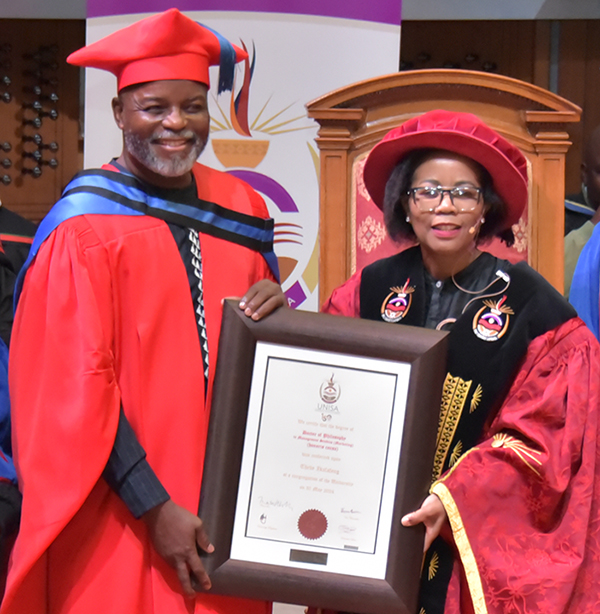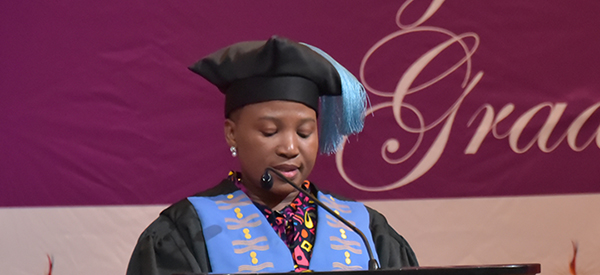News & Media
Receiving Unisa honour, African brand supremo delivers powerful message on Africanness
On 30 May 2024, Thebe Ikalafeng, a true beacon of visionary leadership in the realm of Africa-focused branding and marketing, was conferred with the degree of Doctor of Philosophy in Management Sciences (Honoris Causa) by Unisa in recognition of his lifelong commitment to learning, his impactful contributions and his singular accomplishments in business.

Honouree Thebe Ikalafeng and Prof Puleng LenkaBula, Unisa Principal and Vice-Chancellor
Acting Executive Dean of the College of Economic and Management Sciences, Dr Mantepu MaseTshaba, introduced Kimberley-born Ikalafeng as the founder of the Africa Brand Leadership Academy (ABLA), whose aim is to develop capacity and talent for Africa-focused brand leadership. She continued: "He stands as a beacon of visionary leadership in the realm of branding and marketing. He has dedicated himself to nurturing Africa-focused brand leadership, aiming to amplify the continent’s presence in the global stage."
MaseTshaba said that Ikalafeng is a Chartered Marketer (SA), and holds a BSc that he obtained in 1992 and an MBA, specialising in marketing, obtained in 1993, both from Marquette University in the United States. She continued: "He also holds a Master of Laws degree in intellectual property, obtained in 2021 from the University of Turin in Italy, offered in collaboration with the World Intellectual Property Organisation in Geneva, Switzerland."
A true champion of lifelong learning
She commended him on his commitment to continuous learning, as demonstrated by his completion of executive education programmes with Wits University and the Harvard Business School.
MaseTshaba went on to touch on some of the highlights in Ikalafeng’s stellar career, including extensive and diverse public and private sector directorships at Mercantile Bank, WWF South Africa, and South African Tourism. He also served on the board of Brand South Africa and NIKE South Africa.

Acting Executive Dean of the College of Economic and Management Sciences, Dr Mantepu MaseTshaba
A brand-led renaissance
MaseTshaba praised Ikalafeng as the preeminent African authority on branding. "He has garnered recognition for his advocacy of a brand-led African Renaissance," she said. "His influence has been recognised by prestigious publications and organisations such as New African Magazine, Most Influential People of African Descent, and Reputation Poll International."
She concluded: "His unwavering commitment to shaping a positive narrative for Africa has left an indelible imprint on the continent’s branding landscape. Ikalafeng’s lifelong commitment to learning, his impactful contributions, and his singular accomplishments make him eminently worthy of this honour."
"It is always a proud moment when our society and the university recognise its prophets, its leaders, its inventors – the people who change the world," said Professor Puleng LenkaBula, Unisa Principal and Vice-Chancellor, after conferring the degree on Ikalafeng.
The myth of greener pastures
Taking to the podium amidst resounding applause, Ikalafeng commenced his address by movingly quoting Zimbabwean author NoViolet Bulawayo on the topic of belonging, and also leaving that to which we belong:
Look at them leaving in droves despite knowing they will be welcomed with restraint in those strange lands because they do not belong, knowing they will have to sit on one buttock because they must not sit comfortably lest they be asked to rise and leave, knowing they will speak in dampened whispers because they must not let their voices drown those of the owners of the land, knowing they will have to walk on their toes because they must not leave footprints on the new earth lest they be mistaken for those who want to claim the land as theirs. Look at them leaving in droves, arm in arm with loss and lost, look at them leaving in droves.
"NoViolet was speaking about how many of us are trying to leave the country of our birth to seek what we think are greener pastures elsewhere," said Ikalafeng. "There are no such greener pastures."
Conquest by destroying heritage
He went on to recount statements by colonial thought leaders who stated, among others, that the proud African people can only be conquered if their backbone is broken, and their spiritual and cultural heritage is destroyed. The point of departure of this approach, said Ikalafeng, was to take away Africans’ culture and language, and to make them believe that all that is foreign, that is English, is greater and better than their own.
"These are the people," Ikalafeng continued, "speaking about us as living in a hopeless continent. And they have the nerve to call us corrupt, the nerve to call us poor, the nerve to call us diseased." He said that the conquerers write the history – "they came, they conquered, and they wrote. You cannot expect the people who came to dominate you to tell a good story about you."
We are Africa
"We may be trampled into the dirt," he continued, quoting Maya Angelou, "but still, like dust, we rise. Yet we are the indomitable lions who stopped the Italians from taking over our Ethiopia. We are the twenty-thousand-strong Zulu men who defeated the British with our bare hands in 1879. We are the descendants of Queen Nzinga, who outbattled the Portuguese in the 17th century. We are Africa. Everything we need is right here in our continent. Our job is to reclaim African identity, African culture, our economies, our dignity. We need to reclaim our story, our narrative."
He next quoted Unisa Chancellor Thabo Mbeki when the latter addressed the United Nations University in 1998: "Out of Africa reborn must come modern products of human economic activity, significant contributions to the world of knowledge, in the arts, science and technology, new images of an Africa of peace and prosperity."
Continuing in this vein, Ikalafeng said: "Everyone has an agenda for us; what we need right now is an agenda for Africa. We must stand tall and fight for what is ours. We must proclaim that this our moment. This is our time. This is our Africa."
"I am humbled," concluded Ikalafeng, specifically addressing Unisa’s Vice-Chancellor and its Council, "that 40 years after leaving my Kimberley to seek a place for myself in the world, my journey has led me to this great university."
Watch a recording of the ceremony
* By Philip van der Merwe, Editor, Department of Institutional Advancement
Publish date: 2024/05/31

 Unisa co-hosts G20 community outreach in the Eastern Cape
Unisa co-hosts G20 community outreach in the Eastern Cape
 Unisans gain membership of prestigious science academies
Unisans gain membership of prestigious science academies
 Advocating for disability transformation through servant leadership
Advocating for disability transformation through servant leadership
 Unisa Press continues to illuminate the publishing space
Unisa Press continues to illuminate the publishing space